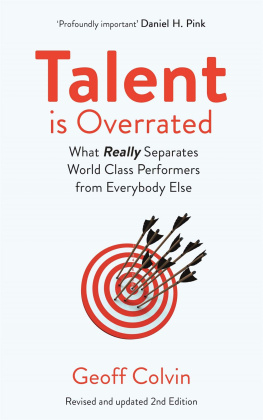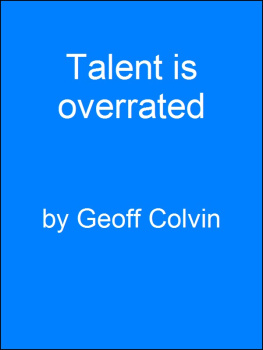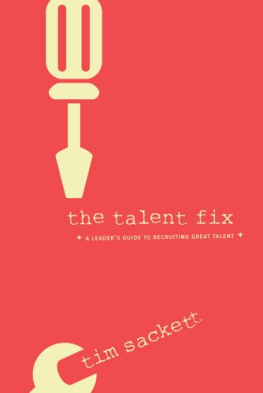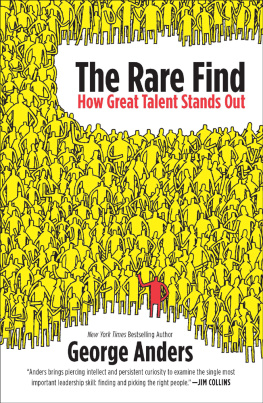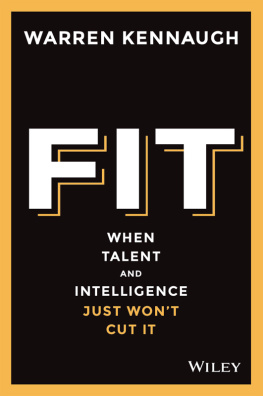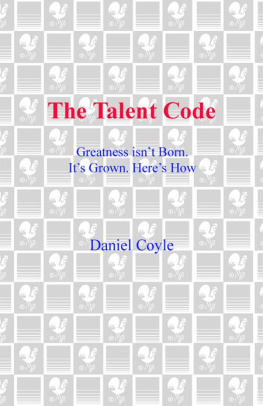Contents
Great performance is more valuable than everbut where does it really come from?
Confronting the unexpected facts about innate abilities
The true role of intelligence and memory in high achievement
An explanation of great performance that makes sense
For starters, it isnt what most of us do when were practicing.
The specific ways it changes us,
and how that makes all the difference
The opportunities are many
if we think about our work in a new way.
Few do it well, and most dont do it at all;
the sooner you start, the better.
How the principles weve learned take us past the myths of creativity
The extraordinary benefits of starting early and continuing on and on
Understanding the deepest question about great performance
This updated edition first published in the UK in 2019 by Nicholas Brealey Publishing
An imprint of John Murray Press
An Hachette company
This updated edition first published in the US by Portfolio in 2018
First edition published in the UK by Nicholas Brealey Publishing in 2008
Copyright Geoff Colvin 2008, 2019
The right of Geoff Colvin to be identified as the Author of the Work has been asserted by him in accordance with the Copyright, Designs and Patents Act 1988.
Every effort has been made to fulfil requirements with regard to reproducing copyright material. The author and publisher will be glad to rectify any omissions at the earliest opportunity.
All rights reserved.
No part of this publication may be reproduced, stored in a retrieval system, or transmitted, in any form or by any means without the prior written permission of the publisher, nor be otherwise circulated in any form of binding or cover other than that in which it is published and without a similar condition being imposed on the subsequent purchaser.
British Library Cataloguing-in-Publication Data
A catalogue record for this book is available from the British Library.
ISBN 978-1-52930-913-3
eBook ISBN 978-1-52930-914-0
Designed by Carla Bolte
Nicholas Brealey Publishing
John Murray Press
Carmelite House
50 Victoria Embankment
London, EC4Y 0DZ, UK
Tel: 020 3122 6000 | Nicholas Brealey Publishing
Hachette Book Group
Market Place Center, 53 State Street
Boston, MA 02109, USA
Tel: (617) 263 1834 |

www.nicholasbrealey.com
www.geoffcolvin.com
About the Author
Geoff Colvin, Fortunes senior editor at large, lectures widely, moderates business conferences worldwide, appears often on television, and offers daily business commentary on the CBS Radio Network. He lives in Fair-field, Connecticut.
For my sons
Preface
O f all you do or would like to do in your life, what is most important? Whatever it is, you can do it immensely better than you ever imagined.
That is this books message. But when the book first appeared in 2008, such a message sounded to most people like mere motivational fluff. Hardly anyone outside a narrowly specialized group of researchers knew that it was actually true in the most rigorous sense, or knew that the path from mediocrity to greatness had been mapped in some detail. The path was long and difficult, but it was clear. Most remarkably, it was, within broad limits, available to the great mass of people. The research showed that we are not restricted by our possession of, or lack of, mysterious natural gifts that dictate what we can or cannot do well. Some of the research even suggested that natural gifts dont exist. It showed instead that we largely determine our own level of accomplishment through a specifically defined activity that the researchers called deliberate practice. The process is within our control.
Virtually no one in the general public knew any of this in 2008. I might not have known it myself if Fortune magazine hadnt asked me to write an article about great performance in 2006. Thats when I discovered the overlooked trove of scientific work on the reality of human performance and realized that it sharply contradicted what most people fervently believe about an issue that shapes all our lives. That is why I felt compelled to write this book.
The response showed that a great many people understood in some deep way that the message of the research was right, but until they saw the findings, they couldnt articulate how or why. Once they read about the research, they became passionate. Even athletes, coaches, and musicians, who I assumed already understood the principles of deliberate practice in their bones, embraced the book. Businesspeople, in a field that had largely disdained the principles, saw it as a revelation. Most intensely of all, parents around the world told me their children needed to hear this message.
Many subsequent books and articles have mined the research, some insightfully, others incompletely and even misleadingly. From whatever source, far more people today are aware of the scientific work on this topic and its essential message. It was time to revise this book to take account of this higher level of awareness, to address some of the misconceptions that have accompanied it, and to update the research.
The fundamental message still stands and still needs saying. While millions of people today accept and celebrate the message, millions more still doubt it. They havent shaken their belief in natural gifts or in most cases their tragic conviction that they themselves dont have one.
They have yet to learn: You dont need one. Gifts, if they exist, dont make anyone great. The evidence still shows overwhelmingly that better performance, even greatness, is a choice. The ability to perform at levels higher than we ever thought possible rests in our own hands.
Chapter One
The Mystery
Great performance is more valuable than everbut where does it really come from?
I t is mid-1978, and we are inside the giant Procter & Gamble headquarters in Cincinnati, looking into a cubicle shared by a pair of twenty-two-year-old men, fresh out of college. Their assignment is to help sell Duncan Hines brownie mix, but they spend a lot of their time just rewriting memos according to strict company rules. They are clearly smart: One has just graduated from Harvard, the other from Dartmouth. But that doesnt distinguish them from a slew of other new hires at P&G. What does distinguish them from many of the young go-getters the company takes on each year is that neither man is particularly filled with ambition. Neither has any kind of career plan or any specific career goals. Every afternoon they play waste-bin basketball with wadded-up memos. One of them later recalls, We were voted the two guys probably least likely to succeed.
These two young men are of interest to us now for only one reason: They are Jeffrey Immelt and Steven Ballmer, who before age fifty would become CEOs of the worlds two most valuable corporations, General Electric and Microsoft. Contrary to what any reasonable person would have expected when they were new recruits, they reached the absolute apex of corporate achievement. The obvious question is how.
Was it talent? If so, it was a strange kind of talent that hadnt revealed itself in the first twenty-two years of their lives. Was it brains? These two were sharp but had shown no evidence of being sharper than thousands of their classmates or colleagues. Was it mountains of hard work? Certainly not up to that point.
Next page
